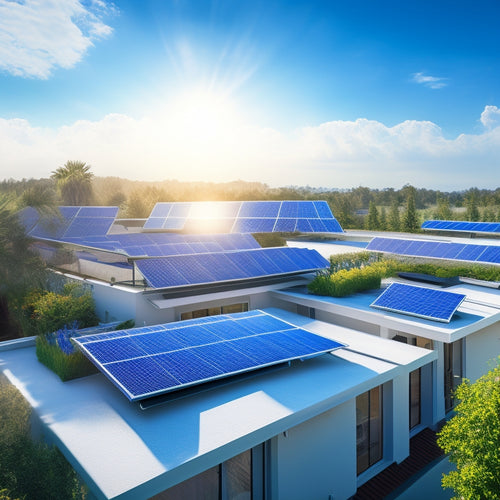
Unlock Affordable Solar: Financing Options Explained
Share
You're likely aware that the upfront cost of solar panel installation can be a significant barrier to going green, but various financing options are now available to make solar energy more accessible and affordable for homeowners like you. Green bonds, home equity loans, unsecured solar loans, PACE financing options, solar panel lease agreements, and power purchase agreements are just a few alternatives to contemplate. By understanding these financing options, credit requirements, and government incentives, you can access affordable solar energy and start enjoying its benefits. As you explore these alternatives further, you'll discover the perfect path to sustainable energy for your home.
Key Takeaways
• Green bonds offer a stable investment option with fixed returns, supporting environmentally friendly solar projects.
• Home equity loans and unsecured solar loans provide financing alternatives, with varying repayment terms and interest rates.
• PACE financing options tie loan repayment to property taxes, offering flexible repayment terms and municipal incentives.
• Solar panel lease agreements and power purchase agreements provide zero upfront costs, predictable energy costs, and renewable energy benefits.
• Government incentives, including tax credits and grants, significantly reduce the upfront cost of going solar for homeowners.
Top Financing Options Compared
When contemplating solar panel installation, you're likely weighing the costs and benefits of different financing options, which is why we've put together a thorough comparison of the top financing options available to you.
As you explore your options, it's crucial to factor in the Solar ROI (Return on Investment) of each choice. This metric helps you understand the financial benefits of going solar, including the amount of money you'll save on your energy bills and the increase in your property value.
One attractive option is Green Bonds, a type of impact investment that supports environmentally friendly projects like solar panel installation. Green Bonds offer a fixed return, typically between 3-5%, making them an attractive option for those seeking a stable investment. Additionally, some Green Bonds are certified by organizations like the Climate Bonds Initiative, ensuring that your investment is genuinely supporting renewable energy projects.
Loan Options for Solar Panels
When considering loan options for solar panels, you're likely to come across three main types: Home Equity Loans, Unsecured Solar Loans, and PACE Financing Options.
Each has its pros and cons, and understanding their differences is key to making an informed decision.
Home Equity Loans
You can tap into your home's value to finance your solar panel installation with a home equity loan, which allows you to borrow a lump sum using your property as collateral. This type of loan is ideal for homeowners who've built up significant equity in their property. With a home equity loan, you can borrow a large sum of money at a fixed interest rate, which can be used to cover the upfront costs of your solar panel installation.
Home equity loans are often used for home renovation projects, and solar panel installation is no exception. By tapping into your home's value, you can finance your solar panel installation without depleting your savings. Additionally, the interest on your home equity loan may be tax-deductible, which can help reduce your taxable income.
If you're considering refinancing your mortgage, you may also be able to combine your refinance with a home equity loan to cover the cost of your solar panel installation. This can be a cost-effective way to finance your solar panel installation while also consolidating your debt.
Unsecured Solar Loans
If you don't have enough equity in your home or prefer not to use your property as collateral, unsecured solar loans offer a financing alternative, allowing you to borrow funds specifically for your solar panel installation without putting your home at risk. These loans provide a convenient way to finance your solar project, offering loan alternatives that cater to your financial needs. With unsecured solar loans, you can enjoy the benefits of solar energy while keeping your home equity intact.
You'll typically need a good credit score to qualify for an unsecured solar loan, which may come with a fixed interest rate and a repayment term that suits your budget. This financing option allows you to tap into solar savings without compromising your property. By choosing an unsecured solar loan, you'll be able to reduce your energy bills and start enjoying the benefits of solar power without delay.
With various loan alternatives available, you can select the one that best aligns with your financial goals, making it easier to shift to a clean, renewable energy source.
PACE Financing Options
Property Assessed Clean Energy (PACE) financing options allow homeowners to fund their solar panel installations through a special type of municipal financing that ties the loan repayment to their property taxes. You'll find that PACE financing is particularly appealing because it doesn't require a credit check or a lien on your property. Instead, the loan is repaid through an annual assessment on your property taxes. This approach enables you to benefit from the energy savings while spreading the cost over several years.
As a homeowner, you'll appreciate that PACE financing offers flexible repayment terms, often ranging from 10 to 25 years. Additionally, many municipal governments offer incentives, such as lower interest rates or rebates, to encourage homeowners to adopt solar energy solutions. These municipal incentives can significantly reduce the overall cost of your solar panel installation.
Solar Panel Lease Agreements
When considering solar panel lease agreements, you'll likely be attracted to the zero upfront costs, which can make going solar more accessible.
You'll typically enter into a monthly payment plan, where you'll pay a fixed amount each month to use the solar panels installed on your property.
At the end of the lease term, you'll usually have options to purchase the system, renew the lease, or have the panels removed, giving you flexibility and control.
Zero Upfront Costs
With zero upfront costs, solar panel lease agreements allow you to shift to green energy without breaking the bank, providing a cost-effective way to harness renewable energy.
This financing option is ideal for homeowners who want to switch to solar power without incurring significant initial expenses. With a solar panel lease agreement, you can enjoy free installation, which means you won't have to pay anything upfront.
This zero-down approach enables you to conserve your cash flow and allocate it to other essential expenses. In return, you'll make regular lease payments, typically over a fixed term, which can range from 10 to 20 years.
During this period, you'll benefit from the electricity generated by the solar panels, reducing your reliance on the grid and lowering your energy bills. By choosing a solar panel lease agreement with zero upfront costs, you can move to clean energy while maintaining a healthy cash flow.
Monthly Payment Plans
Through a solar panel lease agreement, you'll make fixed monthly payments that are often lower than your current electricity bills, allowing you to enjoy the benefits of solar energy while maintaining a predictable budget. This financing option provides budget flexibility, as you'll have a clear understanding of your monthly expenses, making it easier to plan your finances.
With a solar panel lease, you'll have access to payment customization, which means you can tailor your monthly payments to fit your unique financial situation. This could include adjusting the payment term, payment amount, or even the upfront costs. By customizing your payments, you'll have more control over your budget, ensuring that you can afford the solar energy system you need.
With a lease agreement, you'll have the opportunity to benefit from solar energy without breaking the bank. By making fixed monthly payments, you'll be able to enjoy the advantages of solar power while maintaining a stable financial situation.
End-of-Term Options
When evaluating your solar panel lease agreement, you'll typically have three options to consider: purchasing the system, returning the equipment, or extending the lease.
When contemplating purchasing the system, you may opt for a Contract Buyout, where you pay a predetermined amount to own the solar panel system outright. This option can be beneficial if you've grown attached to the system and want to continue harnessing its benefits.
On the other hand, if you're no longer interested in utilizing the system, you can choose to return the equipment, which involves System Removal. This process typically involves the leasing company reclaiming the system, and you'll no longer be responsible for its maintenance or upkeep.
Lastly, you may decide to extend the lease, which can be a viable option if you're not ready to commit to purchasing the system or parting ways with it. This choice allows you to continue benefiting from the solar panel system while exploring your options for the future.
It's important to carefully weigh the pros and cons of each option, considering factors like cost, maintenance, and your long-term energy goals.
Power Purchase Agreements Explained
You enter into a power purchase agreement (PPA) when you agree to buy electricity from a solar developer at a fixed rate, typically lower than your current utility rate. This means you'll enjoy predictable energy costs, shielding you from rising utility prices. In a PPA, the developer handles the installation, maintenance, and monitoring of the solar system, while you simply purchase the electricity it generates.
The benefits of a PPA are substantial. To start with, you'll reap significant energy savings, as you'll be paying a fixed rate for electricity that's often lower than your current utility rate. This translates to reduced energy bills and a lighter burden on your wallet.
Additionally, you'll be supporting clean, renewable energy and reducing your carbon footprint. With a PPA, you can enjoy the advantages of solar energy without the upfront costs of installation and maintenance. As you'll be locked into a fixed rate for the duration of the agreement, you'll have peace of mind knowing exactly how much you'll be paying for your energy needs.
Credit Requirements Uncovered
When exploring solar financing options, monitoring your credit score plays a significant role in determining eligibility and interest rates for various financing methods, including power purchase agreements and loans. A good credit score can open doors to better financing options, lower interest rates, and more favorable terms. On the other hand, a poor credit score can limit your options and increase your borrowing costs.
To improve your chances of securing affordable solar financing, it's crucial to:
-
Monitor your credit report: Verify it's accurate and up-to-date to avoid any surprises during the financing process.
-
Maintain a good credit utilization ratio: Keep your credit card balances low to demonstrate responsible credit behavior.
-
Make timely payments: A history of on-time payments will help you build a strong credit profile.
-
Avoid new credit inquiries: Applying for multiple credit products can negatively impact your credit score.
-
Develop financial literacy: Understanding credit scoring and its impact on financing options will help you make informed decisions.
Solar Financing Interest Rates
Understanding the intricacies of solar financing interest rates is essential, as they can greatly impact the overall cost of your solar panel system, with even a slight variation in rates translating to thousands of dollars in savings or additional expenses over the loan's lifespan.
You'll want to pay attention to the fixed APR (annual percentage rate) attached to your loan, as it determines the total interest paid over the loan term. A lower fixed APR means lower interest payments, resulting in significant long-term savings.
Some lenders offer dynamic pricing, which allows you to take advantage of market fluctuations and secure a better interest rate. This approach can be beneficial if you're willing to monitor and adjust your loan terms accordingly. However, it's important to carefully review the terms and conditions, as dynamic pricing can also lead to higher interest rates if market conditions change unfavorably.
Government Incentives for Homeowners
The federal government offers a 30% tax credit to homeowners who invest in solar energy systems, allowing them to claim a substantial portion of their installation costs back on their taxes. This incentive can greatly reduce the upfront cost of going solar, making it more accessible to you.
In addition to the federal tax credit, you may be eligible for other government incentives, such as:
-
State tax credits: Many states offer additional tax credits or rebates for solar installations.
-
Renewable grants: The US Department of Agriculture provides grants for rural homeowners to invest in renewable energy systems.
-
Net metering: You can sell excess energy back to the grid and receive a credit on your utility bill.
-
Property tax exemptions: Some states exempt the added value of solar installations from your property taxes.
-
Sales tax exemptions: You may be exempt from paying sales tax on your solar installation in some states.
These government incentives can significantly reduce the cost of going solar, making it a more affordable option for you.
Financing for Low-Income Families
Low-income families can access solar energy through specialized financing programs, which often combine government incentives with private funding to make solar installations more affordable. As you explore these options, you'll find that many programs prioritize energy equality, recognizing that everyone deserves access to clean energy, regardless of income level.
One example is the Low-Income Home Energy Assistance Program (LIHEAP), which provides financial assistance to low-income households for energy-related expenses, including solar installations.
Community outreach programs also play an essential role in connecting low-income families with solar financing options. Non-profit organizations, like GRID Alternatives, offer subsidized solar installations and job training programs, promoting energy equality and community development. Additionally, some states offer special tariffs or rates for low-income households, reducing their energy costs and making solar more accessible.
Frequently Asked Questions
Can I Finance Solar Panels if I'm Renting My Home?
You can't finance solar panels as a renter, but you can negotiate with your landlord to install a system, benefiting from reduced energy bills and potentially increased property value through landlord agreements.
Do Solar Financing Options Affect My Credit Score?
When you explore solar financing options, you'll likely face credit checks that scrutinize your financial history, which may temporarily ding your credit score, but a good payment history can ultimately boost your creditworthiness.
Are There Solar Financing Options for Non-Profit Organizations?
"As you navigate the solar landscape, imagine sailing through calm waters, and you'll find that, yes, there are solar financing options for non-profit organizations, including grant funding opportunities and corporate sponsorships that can help you harness the power of the sun."
Can I Pay off My Solar Loan With a Tax Refund?
You can pay off your solar loan with a tax refund, leveraging loan forgiveness and refund strategy to accelerate your solar savings. Use seasonal payments and refund planning to maximize tax benefits and accelerate loan payoffs.
Do Solar Financing Companies Offer Maintenance Services?
As you're enjoying the benefits of solar energy, you're probably wondering if solar financing companies offer maintenance services. Coincidentally, they often do, providing system checks and warranty options, ensuring your system runs efficiently and prolonging its lifespan.
Related Posts
-

Waterproofing Solar Panels for Vehicles: A Step-by-Step Guide
When waterproofing solar panels for your vehicle, start by evaluating your energy requirements and selecting the righ...
-

What You Need to Know About Permits and Inspections
You need to navigate the complex landscape of permits and inspections to guarantee your project complies with local z...
-

Best Solar Panel Options for Maximum Energy Savings
You can maximize your energy savings with solar panels that boast efficiency ratings above 20%, paired with extensive...


